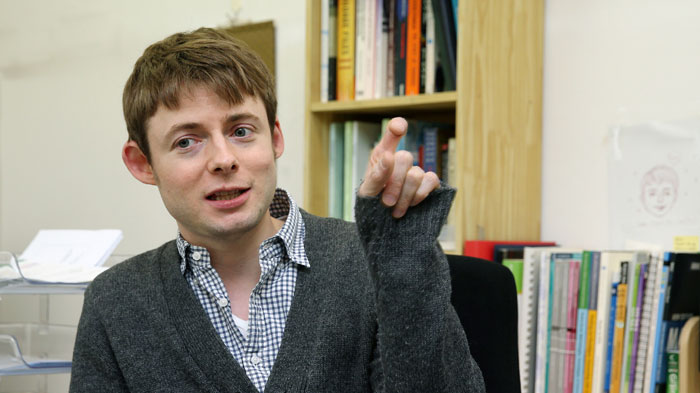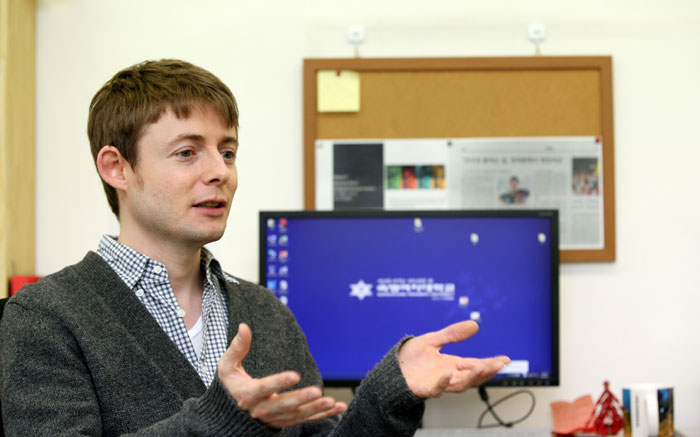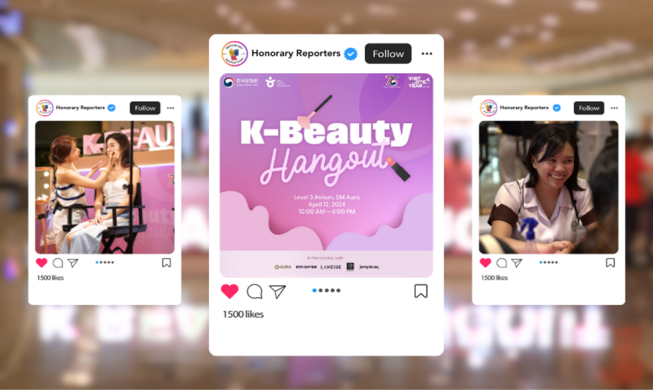-
 Korea.net's 24-hour YouTube channel
Korea.net's 24-hour YouTube channel- NEWS FOCUS
- ABOUT KOREA
- EVENTS
- RESOURCES
- GOVERNMENT
- ABOUT US
How deep can a person know the culture of another country while living overseas?
Instructor Barry Welsh of Sookmyung Women’s University has his own answer: learn through literature and movies.
A book he chose in the Korean Literature in English section of a large bookshop a few years ago became the inspiration for him to form a book club focusing on Korean literature for international residents of Seoul.

Welsh studied literature and film at the University of Liverpool and at the University of Edinburgh, achieving his bachelor's and master's. He had to work in the finance industry for a while, but he was always interested in studying the literature of other countries.
When Welsh came to Korea five years ago from Scotland, it was natural for him to take an interest in Korean literature as he tried to get used to his new life. Slowly, he read Korean literary works translated into English, broadening his understanding of Korean society and culture. Then, he decided to organize a book club to share the same interests with others.
Welsh formed a book club where people read Korean literature works translated into English and then engage in discussions. He introduced the club to his friends, colleagues and online. Only six people attended the first meeting. He was on the verge of giving up. However, more people, including Korean writers he got to know online, helped him. Twenty people came to the second meeting. The number jumped to 60 at the third gathering. By running the meeting, Welsh gradually had an idea on how to manage the book club.
The club was introduced online to many people through social media channels. Marking its fourth year in 2015, the book club, now dubbed the “Seoul Book & Culture Club,” takes place once per month at Haechi Hall in Myeong-dong, downtown Seoul. Writers are often invited for interviews, answer questions and engage in discussions with the audience about their personal experiences, life stories and so on. So far, invited writers include Hwang Sok-yong, Shin Kyung-sook, Gong Ji-young, Kim Young-ha, Park Min-gyu and Hwang Sun-mi, as well as some Korean-American and international writers from overseas. Each meeting is attended by about 100 or 200 people. The attendees vary, and include university professors, students, teachers, overseas envoys and U.S. soldiers.
Starting last year, Welsh began to run a film club. On the last Saturday of every month, at the same venue, he introduces a Korean classical move at his “Seoul Film Society, Hosted by Barry Welsh." The free club shows various Korean films, some tracing back to the 1950s. Movies he has shown so far include "Hanyeo" (1960), "Black Hair" (1974), "Madame Freedom" (1956) and "Aimless Bullet" (1961).

Korea.net sat down with Welsh to talk about the literature and film clubs, and his future plans.
The Seoul Book & Culture Club will take place this Saturday, January 24, at 2 p.m,, at Haechi Hall in Myeong-dong. Poet Ko Un will be the guest.
More information about the club is available at its homepage: http://www.seoulabc.com
By Yoon Sojung
Photos: Jeon Han
Korea.net Staff Writers
arete@korea.kr
Instructor Barry Welsh of Sookmyung Women’s University has his own answer: learn through literature and movies.
A book he chose in the Korean Literature in English section of a large bookshop a few years ago became the inspiration for him to form a book club focusing on Korean literature for international residents of Seoul.

Instructor Barry Welsh of Sookmyung Women’s University formed a Korean literature and film book club to share his interests with others.
Welsh studied literature and film at the University of Liverpool and at the University of Edinburgh, achieving his bachelor's and master's. He had to work in the finance industry for a while, but he was always interested in studying the literature of other countries.
When Welsh came to Korea five years ago from Scotland, it was natural for him to take an interest in Korean literature as he tried to get used to his new life. Slowly, he read Korean literary works translated into English, broadening his understanding of Korean society and culture. Then, he decided to organize a book club to share the same interests with others.
Welsh formed a book club where people read Korean literature works translated into English and then engage in discussions. He introduced the club to his friends, colleagues and online. Only six people attended the first meeting. He was on the verge of giving up. However, more people, including Korean writers he got to know online, helped him. Twenty people came to the second meeting. The number jumped to 60 at the third gathering. By running the meeting, Welsh gradually had an idea on how to manage the book club.
The club was introduced online to many people through social media channels. Marking its fourth year in 2015, the book club, now dubbed the “Seoul Book & Culture Club,” takes place once per month at Haechi Hall in Myeong-dong, downtown Seoul. Writers are often invited for interviews, answer questions and engage in discussions with the audience about their personal experiences, life stories and so on. So far, invited writers include Hwang Sok-yong, Shin Kyung-sook, Gong Ji-young, Kim Young-ha, Park Min-gyu and Hwang Sun-mi, as well as some Korean-American and international writers from overseas. Each meeting is attended by about 100 or 200 people. The attendees vary, and include university professors, students, teachers, overseas envoys and U.S. soldiers.
Starting last year, Welsh began to run a film club. On the last Saturday of every month, at the same venue, he introduces a Korean classical move at his “Seoul Film Society, Hosted by Barry Welsh." The free club shows various Korean films, some tracing back to the 1950s. Movies he has shown so far include "Hanyeo" (1960), "Black Hair" (1974), "Madame Freedom" (1956) and "Aimless Bullet" (1961).

Welsh says he is proud of the book club, and feels rewarded as people can share their thoughts with the writers at the meetings.
Korea.net sat down with Welsh to talk about the literature and film clubs, and his future plans.
- What made you to begin a Korean literature book club and a Korean film club?
I was always interested in literature and films from all over the world. Also, I always used literature and film to connect with the world. When I came here, I brought those interests with me. So I slowly started reading Korean literature and watching Korean films. Then I decided to build a community of people who are interested in the same things.
- What do you think is the key that has helped the club last for such a long time?
I just think there was an audience for it. I think such a club was missing from the cultural scene in Seoul. There are incredible writers and there are non-Korean residents interested in accessing them and their works. They might not know how and where and what works are available. Getting a chance to meet Hwang Seok-young is amazing and it is a great opportunity to talk about their works and listen to their rich life stories. Also, this is technically aimed at international residence, but anybody is welcome. We have a lot of Korean and international people.
- How many Korean writers have you dealt with so far? I know you've read Hwang Seok-young, Shin Kyung-sook, Kong Ji-young and Kim Young-ha. Which of their works did they talk about?
There have been 35 special guests so far. Around 15 of them have been Korean novelists. The rest have been Korean-American or international writers from the U.S., Britain or elsewhere. We do not choose specific works to read and discuss. A moderator interviews the invited writer and then the writer receives questions from the audience. Questions vary, as they can ask about the writer’s personal stories or experiences. In the case of Hwang Seok-young, we asked about the background for his works, such as the Gwangju democratic movement and the Vietnam War. .
- Please tell us about your favorite, or an impressive, Korean literary work among the writers you've met through the book club so far.
The first Korean novel I read was 'I Have the Right to Destroy Myself' by Kim Young-ha, so it has a special place in my heart. I think Hwang Sok-yong's Vietnam novel, 'The Shadow of Arms' is an incredible piece of work. His short story 'Road to Sampo' is also very moving and elegant. Most recently, Park Min-gyu's short stories have impressed me a great deal. The female writers are also very interesting. Shin Kyung sook's 'I'll be There' is a moving and important book, as is Gong Ji-young's 'Our Happy Time.' Hwang Sun-mi's 'The Hen Who Dreamed She Could Fly' is a great fable, too.
Personally, I think Yi Mun-yol's works are great. I believe he is a world-class writer. His short stories are amazing.
- Tell us about some Korean films that impressed you.
I would say that Lee Chang dong's 'Poetry' really opened my eyes to modern Korean cinema. As for classic Korean films, I would say that 'Hanyeo,' 'Black Hair,' Madame Freedom' and 'Aimless Bullet' are all fascinating films with interesting things to say about society and history.
- What makes Korean literature different from English-language Western literature?
There are definitely differences. Many of the literary works I read here are ones translated into English. Sometimes, however, I feel that the works that are chosen for translation into English only deal with what Korean people think are important or significant about their history or society. They all deal with the Korean War or the Japanese occupation and are self-consciously serious. Maybe there are readers who would like to read more accessible and more interesting works. That’s why Park Min-gyu or Kim Young-ha are really popular, I guess. Also, there isn't much genre fiction, like science fiction or detective stories, compared with Western literature.
- You’ve been in Korea for five years. What do you feel about modern Korean society? Have your feelings changed after living here for a while?
Everything was new and fresh in the beginning, but now, it feels like home and feels like my life. Although different from what I was used to living in Scotland, England or Ireland, I am happy with my life here. Seoul is so international and so metropolitan. Living in Seoul is like living in London. I like the international side of Seoul.
- What are 'Korean people' and 'Korean society' like, in your view?
From my experiences teaching students and living here, I think they are pressurized. I guess they are pushed to do so much, considering the education system, students who go to after school cram schools at night or office workers who work late into the night.
There is a great quote from Lee So-yeon, the first Korean astronaut. She said in an interview, “Where's the champagne? We achieved so much in such a short space of time. We deserve some celebration,” mentioning the accomplishments of her country.
- Do you know that Koreans once sang 'Auld Lang Syne' when singing their national anthem in the past? What do you think of such ties?
Actually, I didn’t know that, but learned about it when I saw the movie 'Ode to My Father,' as I saw people singing that song on screen. I didn’t know why the song is included in the movie, but I realized later that such ties existed.
- It is impressive that you know Scottish missionaries in Korea. Can you tell us about the literature of your country in the book club?
I would love to introduce more British writers and international writers at the book club. Starting next month, I will be screen classic British films at Heachi Hall.
- Talking about culture seems to have the power to help people remember it for longer. What do you wish to achieve through such dialogue? What do you want to say in the discussions?
I don’t have any special message or wish, but I hope many people can take an interest in literature and engage in related activities.
- Do you have any rewarding or memorable moments?
I feel happy when receiving messages from people who say they enjoyed the meeting or who say so online. This is the proudest thing I have ever done. I wish to continue the meeting as much as possible.
- What are your future plans?
I wish to invite other people in the book club, not just writers. For example, I want to invite Lee So-yeon, the astronaut, or director Bong Joon-ho. That would be fantastic. Imagine how great it would be if we could invite director Bong and talk about his works and listen to his stories. Seoul Mayor Park Won-soon or Representative Ahn Cheol-soo would also be great.
The Seoul Book & Culture Club will take place this Saturday, January 24, at 2 p.m,, at Haechi Hall in Myeong-dong. Poet Ko Un will be the guest.
More information about the club is available at its homepage: http://www.seoulabc.com
By Yoon Sojung
Photos: Jeon Han
Korea.net Staff Writers
arete@korea.kr













